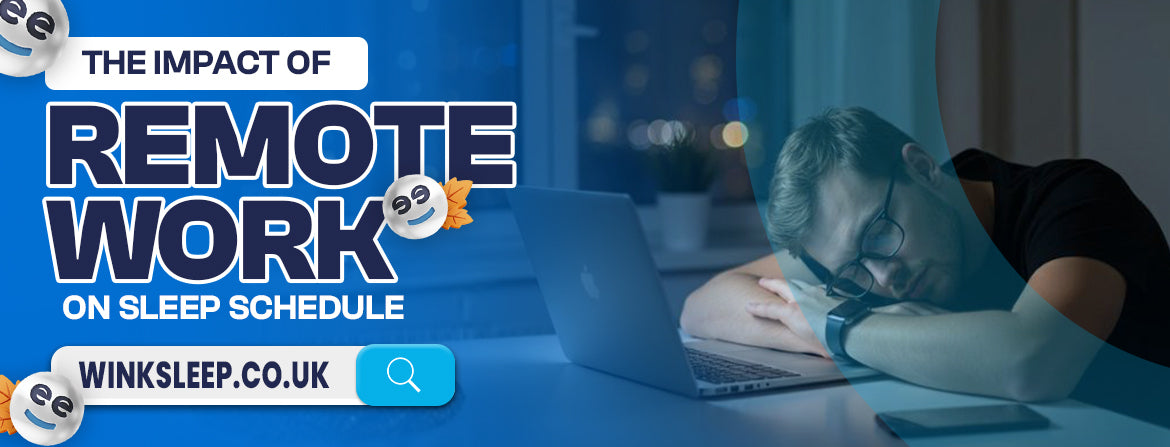Working from home has changed the way many people sleep. Since the rise of remote jobs, a large number of workers report that their sleeping patterns are no longer the same. Without a set routine, it becomes easy to stay up late, wake up tired, or spend too much time on screens. These changes may look small, but they can affect mood, focus, and health.
This article explains how remote work affects sleep and offers a simple 14-day plan to bring back a healthy routine. It also shares ways to create a calm bedroom that supports better rest.
Why Remote Work Disrupts Sleep
Loss of daily routine
Commuting used to help people start and end their day at fixed times. Working from home removes that structure. Many remote workers wake up later or keep working into the night. This shift confuses the body clock and makes it harder to fall asleep at a regular hour.
Too much screen time
Remote work means more hours in front of computers, phones, or tablets. Blue light from screens affects melatonin, the hormone that helps us sleep. Late-night emails or scrolling through social media can delay sleep by several hours.
Blurred space between work and rest
When the same room is used for both work and rest, the brain struggles to switch off. Some people even work from bed, linking that space with activity and stress rather than relaxation. This habit slowly reduces sleep quality.
Irregular schedules
Flexible hours sound good, but without clear limits they often lead to inconsistent bedtimes. People who sleep and wake up at different times each day experience what experts call “social jet lag”. It’s similar to changing time zones every few days.
Health Risks from Irregular Sleep Patterns
Poor sleep affects more than energy levels. Studies show that people with disturbed sleep have a higher risk of anxiety, low mood, and slow reaction time. Long-term sleep loss can also affect blood pressure, weight control, and focus.
Those who work remotely and stay up late for meetings across time zones often feel constant fatigue. Over time, this can reduce productivity and make it harder to separate personal and professional life.
The 14-Day Reset Plan to Restore Your Sleep Schedule
Fixing a sleep routine takes commitment, but it’s not complicated. The goal is to help the body learn when to rest and when to stay active.
Morning routine (Days 1-7)
- Wake up at the same time every day, even on weekends.
- Step outside or open curtains right after waking to get natural light.
- Avoid the phone or laptop for at least 20 minutes.
- Stretch or take a short walk to boost energy.
- Eat breakfast at a regular time to anchor your day.
Evening routine (Days 1-7)
- Stop working at least one hour before bedtime.
- Reduce screen time after 8 pm; use warm light settings if possible.
- Avoid heavy meals or caffeine late at night.
- Read a book, listen to soft music, or do slow breathing exercises.
- Keep the bedroom cool, dark, and quiet.
Days 8-14: reinforce and adjust
- Keep wake and sleep times steady.
- If you need a nap, keep it short — 20 minutes before 3 pm.
- Review your space. Replace bright lights with warm lamps.
- Check your mattress for comfort and support; a sagging bed can disturb rest.
- Try light stretching or mindfulness before sleep to relax the body.
Make Your Bedroom a Sleep Sanctuary
The place where you sleep plays a major role in how well you rest. A peaceful bedroom helps the mind relax and tells the body it’s time to slow down.
- Choose the right mattress: A supportive mattress keeps the body in a natural position and reduces tossing and turning. If your mattress is too soft or uneven, it can cause back pain and restless nights.
- Control the light: Use blackout curtains or blinds to block outside light. Soft, warm lamps are better than bright white bulbs at night.
- Set the right temperature: A slightly cool room helps you fall asleep faster. Keep it comfortable but not too warm.
- Reduce noise: Use earplugs or white noise to block sounds from traffic or neighbours.
- Keep work out of the bedroom: Avoid using your laptop or taking calls in bed. Your brain should link that space only with sleep and relaxation.
Creating a calm environment doesn’t need big changes. A few simple adjustments can make the bedroom feel restful and inviting.
Special Situations: Time Zones and Irregular Schedules
Many remote workers handle meetings across different time zones. These shifts can easily confuse your sleep rhythm. If you often stay awake late for overseas calls, try keeping a fixed wake-up time. A short nap in the afternoon is fine but avoid sleeping long hours during the day.
For those who switch between office and home days, it helps to keep similar wake-up and sleep times even on commute days. This keeps the body clock steady.
If your work hours change often, light exposure can help. Spend a few minutes outside in the morning sunlight on days you start late, and use dim lighting at night to signal rest time.
Also read: Why stress keeps you awake and how to overcome it?
Conclusion
Remote work has many benefits, but it also makes it easier to fall into poor sleep habits. Late nights, constant screen use, and a lack of routine can quickly disturb your natural body clock.
By following a simple 14-day plan and creating a peaceful bedroom, you can bring back a stable sleep schedule. Keep your work and rest separate, limit screens at night, and stay consistent with your routine.
A comfortable mattress, the right lighting, and a cool, quiet room can make a big difference. Small daily steps can help you feel more focused, rested, and ready for each new day.
FAQs
Can remote work cause insomnia?
Yes, it can. Irregular hours, stress, and too much screen time can make it hard to fall asleep. Following a set routine helps prevent this problem.
Is it bad to work from bed?
Working from bed trains your mind to link that space with activity and stress. Over time, it becomes harder to relax or fall asleep there. It’s best to keep a separate work area.
How long does it take to fix a sleep schedule?
Most people notice a difference in about two weeks. Staying consistent with your sleep and wake times helps your body adjust faster.
 Build Your Bed
Build Your Bed
 Request FREE Swatches
Request FREE Swatches
 Fast Delivery on Every Product
Fast Delivery on Every Product  Klarna 0% Finance
Klarna 0% Finance  5 Year Manufacturer's Guarantee
5 Year Manufacturer's Guarantee 










